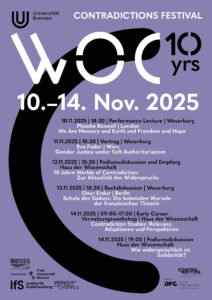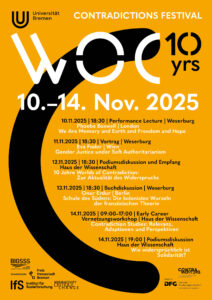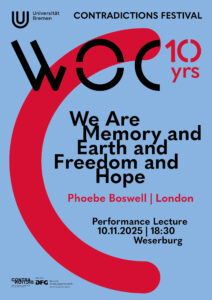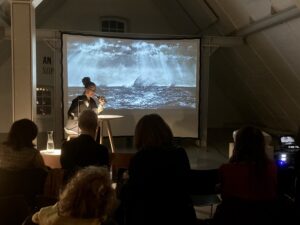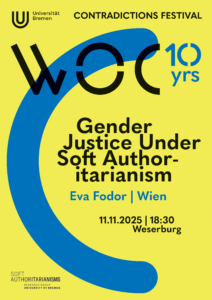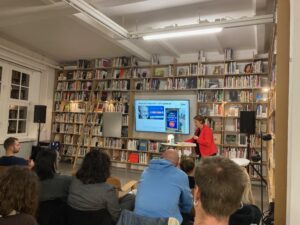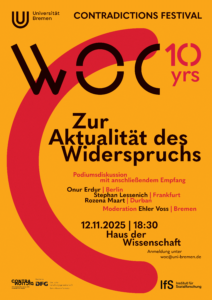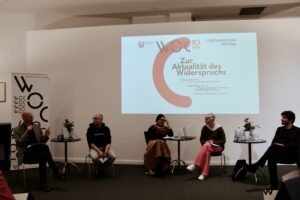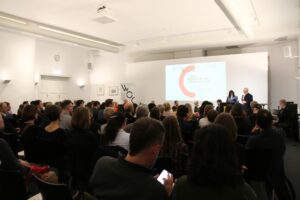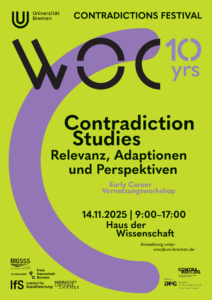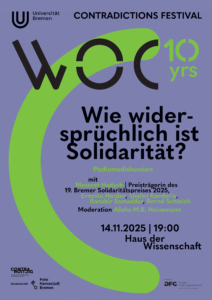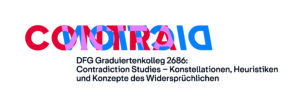WOC Contradictions Festival
10 Jahre Worlds of Contradiction
10.–14. November 2025

Montag, 10.11.2025 | 18:30–20:00
Performance Lecture | Weserburg
Phoebe Boswell (London): We Are Memory and Earth and Freedom and Hope
With a commitment to the black body, the woman body, the queer or non-conforming body, the fugitive body, the errant body, the sick or uniquely abled body, the decolonial body, the collective body, and how it is seen, felt, loved, and cared for, Phoebe Boswell will take us on a candid and illuminating journey through her own trajectory as an artist. In a series of fragments relating to memory, method, our bodies and the narratives they generate, the overlaps, contradictions, and temporality of our histories and geographies, the power of both our presence and our refusal, Boswell will attempt to interrogate and counter the spaces we occupy and the structures that seek to govern us. Through this journey, the performance lecture will directly engage the persistent presence of anticolonial contradiction within our intimate and collective bodies, ushering the need for contestation of the evasive silences, denials, and banalisations of our capitalist colonial present.
Phoebe Boswell is interested in the liminal space between our collective histories and imagined futures; how we see ourselves and each other, and, consequently, how we free ourselves, or imagine freedom. Her figurative and interdisciplinary practice adopts an errant, diasporic framework, moving intuitively across media from drawing and painting to film, video, sound, and writing, to create immersive installations which affect and are affected by the environments they occupy, by time, gestalt, the layering of sound, the serendipity of loops, and the presence of the audience. Often inviting the participation of volunteers to create a nuanced collective voice in the making process, Boswell’s work investigates themes including protest, reclamation, grief, intimacy, migration, the body and its world-making. Her recent work considers the dichotomy of bodies of water as both repositories of painful historical experience and sites of renewal and hope.
Boswell’s paintings, drawings, installations, and film & video works have been exhibited and held in collections widely, including The British Museum, Los Angeles County Museum of Art, RISD, the British Film Institute’s National Archive and the UK Government Art Collection. She was the Bridget Riley Drawing Fellow at the British School of Rome in 2019, received the Lumière Award from the Royal Photographic Society in 2021, the Paul Hamlyn Award in 2019, and the Future Generation Art Prize’s Special Prize in 2017. Boswell was Whitechapel Gallery’s 2022 writer in residence and has presented her writing at institutions including Tate Britain, Victoria & Albert Museum, The Ford Foundation, and Loophole of Retreat Venice. She has had institutional solos at Autograph ABP, New Art Exchange and the Goteborg Konsthall, and participated in the Gothenburg International Biennial for Contemporary Art, the Biennale de l’Image en Mouvement (Switzerland), Prospect New Orleans, and the Lyon Biennale. Boswell was born in Nairobi, Kenya, and lives and works in London.
Dienstag, 11.11.2025 | 18:30–20:00
Vortrag | Weserburg
Eva Fodor (Central European University Wien)
Gender Justice under Soft Authoritarianism
An important feature of the rising tide of authoritarian politics across the world today is their emphasis on crafting ‘gender regimes’ that reassert the role of women in patriarchal terms. In the context of the anti-liberal and soft-authoritarian transformation of Hungarian democracy since 2010, this talk will outline the key challenges to gender justice arising out of the pro-natalist agenda of the Orban government. It will focus especially on how the Orbanist regime shaped a set of policies that ties social citizenship rights to having children, thereby engendering a new variety of gender regime that I call “carefare”. Coupled with the authoritarian crackdown on what is often dubbed “gender ideology” in universities and other spaces in the civil society, this reformulation of the ‘problem of care’ into one of reasserting the gender roles of women poses a powerful challenge to gender justice. While this talk will draw on the distinct trajectory of gender regimes within the specific history of state socialism and post-socialist society in Eastern Europe, it hopes to open a wider dialogue on the ramifications of the rise of soft-authoritarian politics in different parts of the world for the question of gender justice.
Eva Fodor is Professor of Gender Studies and is currently a member of CEU’s Senior Leadership Team as Pro-Rector for Teaching and Learning. She has a Ph.D. in Sociology from the University of California in Los Angeles and works in the field of comparative social inequalities. Specifically, she is interested in how and why gender differences in the labor market and elsewhere are shaped, reshaped, renegotiated and reproduced in different types of societies and in different social contexts. Her recent book, „The Gender Regime of Anti-Liberal Hungary“ describes the introduction of what she calls a „carefare“ regime in Hungary after 2010 (open access with Palgrave Pivot, 2022). Her ongoing research projects puruse this agenda further and seek to create a gendered political economy of illiberalism.
Mittwoch, 12.11.2025 | 18:30–22:00
Festakt | Haus der Wissenschaft
10 Jahre WOC: Zur Aktualität des Widerspruchs | Podiumsdiskussion und Empfang
Podiumsteilnehmer*innen:
Dr. Onur Erdur | Institut für Kulturwissenschaft, Humboldt-Universität zu Berlin & WOC Gastprofessor 2025
Prof. Dr. Stephan Lessenich | Institut für Soziologie, Goethe-Universität Frankfurt am Main & Institut für Sozialforschung
Prof. Dr. Rozena Maart | University of KwaZulu-Natal Durban & Mercator Fellow am WOC Research Center Contradiction Studies
Moderation:
PD Dr. Ehler Voss | Worlds of Contradiction
Mit anschließendem Empfang zum 10-jährigen Bestehen von WOC
Anmeldung unter woc@uni-bremen.de
Donnerstag, 13.11.2025 | 18:30–20:00
Buchdiskussion | Weserburg
Onur Erdur (WOC Gastprofessor 2025): Schule des Südens. Die kolonialen Wurzeln der französischen Theorie
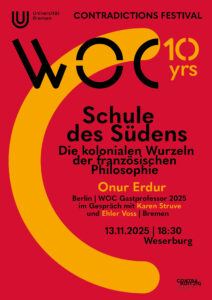


Onur Erdur (Humboldt-Universität zu Berlin & WOC Gastprofessor 2025) im Gespräch mit Karen Struve und Ehler Voss über sein Buch Schule des Südens: Die kolonialen Wurzeln der französischen Theorie.
Freitag, 14.11.2025 | 09:00–17:00
Early Career Vernetzungsworkshop | Haus der Wissenschaft
Contradiction Studies. Relevanz, Adaptionen und Perspektiven
Early Career Vernetzungsworkshop mit Mitgliedern des WOC Graduiertennetzwerks (WOC GradNet), des DFG-Graduiertenkollegs 2686 Contradiction Studies, der Bremen International Graduate School of Social Sciences (BIGSSS), des Instituts für Sozialforschung (IfS) und des GRK 2638 Normativität, Kritik, Wandel.
Programm
09.00–10.00 Begrüßung
Zum Auftakt stellen sich alle Teilnehmenden in einer kurzen Runde vor. Neben der persönlichen Vorstellung beziehen sich alle auch auf den Satz: »Widerspruch ist für meine Forschung relevant, weil …«. Außerdem werden die beteiligten Institutionen in einem 3-minütigen Elevator Pitch durch Vertreter:innen dieser vorgestellt.
10.00–10.30 Kaffeepause
10.30–12.00 Relevanz | Lektüren des Widerspruchs
Ausgehend von vorab versendeten Texten diskutieren wir gemeinsam das Potential der Contradiction Studies für die Beantwortung fachspezifischer Fragestellungen, etwa im Zusammenhang von gesellschaftlichen Dynamiken. Das Gespräch geht von folgenden Fragen aus:
Welche (gesellschaftliche) Relevanz hat Leben in und mit Widersprüchen für das Verständnis offener und/oder geschlossener Gesellschaften?
Wie lassen sich Ansätze der Contradiction Studies für die eigene Forschung produktiv nutzen?
12.00–13.30 Mittagspause
13.30–14.45 Adaptionen | Arbeiten mit Widersprüchen
Anhand kurzer Projektvorstellungen und mitgebrachter Materialien, Texte, Objekte oder Daten wird in Kleingruppen die Anwendung der Contradiction Studies an konkreten Beispielen diskutiert. Ziel ist es, methodische wie theoretische Potentiale und Herausforderungen des Umgangs mit Widersprüchen im eigenen Forschungsmaterial zu erörtern.
14.45–15.00 Kaffeepause
15.00–17.00 Perspektiven | Schreiben im Widerspruch
Der Workshop endet mit einem Versuch: Wir widmen uns der Frage, wie sich Widersprüche nicht nur analysieren, sondern auch schreibend erfahrbar machen lassen. Was bedeutet es, mit Widersprüchen über Widersprüche zu schreiben? In einem Schreibexperiment werden wir unsere eigene Forschung widerspruchsoffen formalisieren. Anschließend reflektieren wir gemeinsam das Potential solcher Textformen für ein widerspruchsaffines Schreiben und damit für ein Verständnis des Widerspruchs als wissenschaftliches Verfahren.
Anmeldungen bitte bis zum 01.11.2025 an Lara Herford unter gradnet@uni-bremen.de.
Freitag, 14.11.2025 | 19:00–20:30
Podiumsdiskussion | Haus der Wissenschaft
Wie widersprüchlich ist Solidarität?
Podiumsdiskussion in Kooperation mit dem DFG-Graduiertenkolleg 2686 Contradiction Studies und der Senatskanzlei der Freien Hansestadt Bremen:
Preisträgerin des 19. Bremer Solidaritätspreises 2025:
Meseret Hadush | Gründerin der Hilfsorganisation Hiwyet (Heilung) in Tigray, Äthiopien
Mitglieder des Kuratoriums des Bremer Solidaritätspreises:
Dr. Ernesto Harder | Geschäftsführer des DGB Region Bremen-Elbe-Weser
Prof. Dr. Shalini Randeria | Central European University & Worlds of Contradiction
Bernd Schleich | ehemaliger Geschäftsführer InWEnt GmbH
DFG-Graduiertenkolleg 2686 Contradiction Studies:
Prof. Dr. Ranabir Samaddar | University of Calcutta
Moderation:
Prof. Dr. Alisha M.B. Heinemann | Worlds of Contradiction
